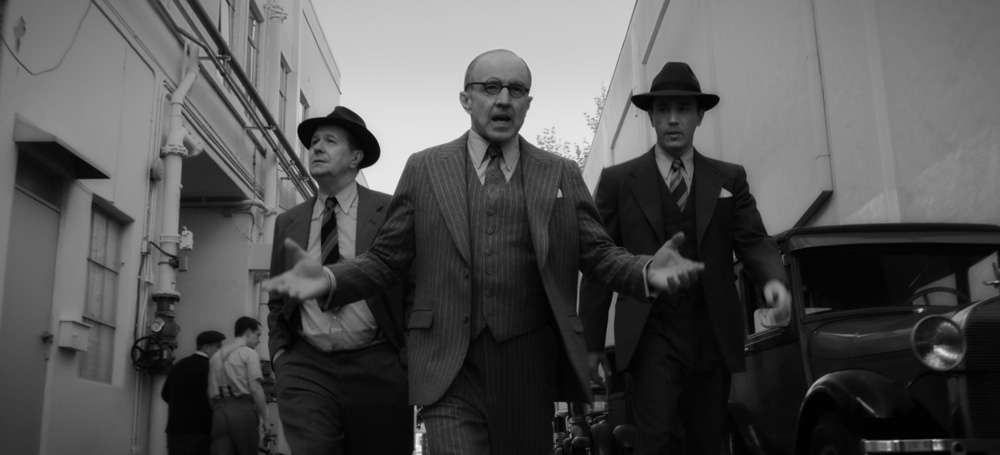2020.12.03
What the Fincher family entrusted to Mankiewicz
Mankiewicz seems to have had a rebellious spirit, but it is unclear what his political beliefs actually were. Mankiewicz's younger brother, Joseph L. Mankiewicz, who later directed `` All About Eve '' (1950) and `` Cleopatra '' (1963), was at one time seen as having a socialist political orientation. However, in the 1934 gubernatorial election, he sided with the conservative Republican camp, and even wrote radio scripts to disparage Sinclair.
In Mank, Mankiewicz is a supporter of Sinclair, at one point jokingly declaring that he is a socialist, not a communist. Perhaps these settings were created by Jack Fincher.
At the very least, Herman's name only appears once in the research book "THE CAMPAIGN OF THE CENTURY: Upton Sinclair's Race for Governor of California and the Birth of Media Politics," which provides a detailed behind-the-scenes look at the campaign. (His younger brother Joseph appears quite often). Regardless of which political camp he was close to, Mankiewicz does not seem to have had a leading role.
According to the same book, which Jack Fincher also seems to have referenced, the episode in the film in which he is pressured by a studio executive to donate to Sinclair's opponent does not belong to Mankiewicz, and that Mankiewicz suffers from Hollywood corruption even more than Mankiewicz. The main character, Shelley Metcalf, is a fictional character created for the film.
In other words, Mankiewicz in "Mank" is a fictional character entrusted with Jack Fincher's feelings, and that's why he was able to be portrayed as a dissatisfied element in Hollywood who sold himself into political struggle. Is it? And if it revolves around a lonely struggle to take revenge on corruption in the film industry, `` Citizen Kane ,'' which has an anti-establishment intent, looks at the misdeeds of Hearst, Louis B. Mayer, and others at close range. Mankiewicz had to be the creator. At least in this movie. Even if it differs from historical fact, that is the story Mank is telling.

“Mank” NETFLIX
David Fincher said he was initially uncomfortable with his father Jack's inclusion of the 1934 California gubernatorial election in the screenplay. The gubernatorial election in question seemed unrelated to the original theme of the artistic conflict between Mankiewicz and Welles. But Jack replied: "I think this is a story about people discovering the importance of the words they speak."
David was only around 30 years old at the time and admits that he wasn't paying attention to what his father, now in his 60s, was saying. However, now that I am closer to my father's age, I believe that the themes of ``contribution in life'' and ``finding one's own voice'' are ``the wonderful bone marrow from which we can grow the red blood cells necessary for this story.'' He says he noticed it. Just like Mankiewicz in the movie, father Jack and son David also realized that they had to ``communicate what needs to be conveyed.''
The 1934 California gubernatorial election was Pandora's proof that you can influence politics and the public by manipulating public psychology through rumors and slander, broadcasting fake news, and pouring large sums of money into conspiracies regardless of your pretenses. It was a box. Few people would deny that this is a development of the "yellow journalism" for which newspaper magnate Hearst gained notoriety, and that it is a familiar reality that still applies to today's times.
The author says that in order to say "NO!" to this reality, Jack Fincher borrowed the legends and historical figures from "Citizen Kane" and created the story of "Mank" as a kind of fantasy. This is the conclusion (I think there should be a debate about the pros and cons of changing history). And David Fincher, who accepted his father's will, made full use of overwhelming visual expression to create even more multi-layered and complex films, but that is another topic and I will not write this article for now. I want to put it.
■Reference materials
Vulture David Fincher interview article
“Nerding Out With David Fincher The director talks about his latest, Mank, a tale of Hollywood history, political power, and the creative act.”
https://www.vulture.com/2020/10/david-fincher-mank.html
Little White Lies David Fincher interview article
"It's All True: A Conversation with David Fincher"
https://lwlies.com/interviews/david-fincher-mank-citizen-kane/
" 'Citizen Kane', it's all The Truth "
Written by Robert L. Carringer Chikuma Shobo
"Raising Kane"
Written by Pauline Kael
https://www.newyorker.com/magazine/1971/02/20/raising-kane-i
https://www.newyorker.com/magazine/1971/02/27/raising-kane-ii
Written by Greg Mitchell Townsend Books
" The Life of Newspaper King William Randolph Hearst "
Written by David Nasaw Nikkei BP Publishing Center
" Orson Welles - Telling about his life "
Written by Orson Welles, Peter Bogdanovich, edited by Jonathan Rosenbaum Kinema Junposha
" Orson Welles Fake Autobiography "
Barbara Leeming Bungeishunju
Posted on WELLESNET
“John Houseman on “What happened to Orson Welles?””
https://www.wellesnet.com/john-houseman-on-what-happened-to-orson-welles/
Text: Akira Murayama
Born in 1971. Writes articles for magazines, newspapers, movie sites, etc. Representative of “ShortCuts,” a review site for distribution-based works.
NETFLIX


